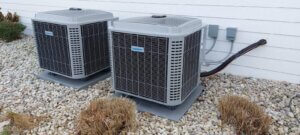Understanding Your Home's HVAC Needs
Size of Your Home: The size and layout of your home play a critical role in determining the capacity of the HVAC system needed. A system that’s too small will struggle to heat or cool your home effectively, while one that’s too large can lead to unnecessary energy consumption.
Local Climate: Your geographic location and local climate significantly impact your heating and cooling needs. Homes in areas with extreme temperatures will require systems with higher efficiency and capacity.
Existing Ductwork: The current state of your home’s ductwork can influence your choice. If your home doesn’t have ducts, ductless systems might be the best solution.
Energy Efficiency: A Key Consideration
Types of HVAC Systems
Central Air Conditioners and Furnaces: This traditional setup is ideal for homes with existing ductwork. It offers efficient heating and cooling but requires sufficient space for the indoor and outdoor units.
Heat Pumps: Heat pumps are highly efficient and can provide both heating and cooling. They are especially effective in milder climates and can reduce energy usage by transferring heat instead of generating it.
Ductless Mini-Split Systems: These are perfect for homes without ductwork. They allow for zoned heating and cooling in different rooms, offering a flexible and energy-efficient solution.
Geothermal Systems: Though expensive to install, geothermal systems offer unparalleled efficiency by using the earth’s stable underground temperature to heat and cool your home.




